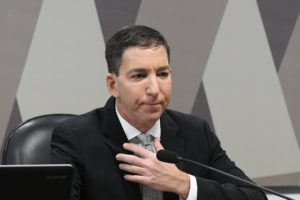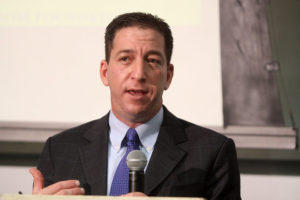U.S. Media Dangerously Regurgitated Government Claims About North Korea and Sony
By reflexively and uncritically repeating the Obama administration's unsubstantiated claim that North Korea was behind the hack of Sony Pictures, the U.S. establishment press once again revealed itself to be a mouthpiece for -- rather than a check on -- power, and thus a danger to public security, Glenn Greenwald writes at The Intercept. Photo by floeschie (CC BY 2.0)
Photo by floeschie (CC BY 2.0)
Photo by floeschie (CC BY 2.0)
By reflexively and uncritically repeating the Obama administration’s unsubstantiated claim that North Korea was behind the hack of Sony Pictures, the U.S. establishment press once again revealed itself to be a mouthpiece for — rather than a check on — power, and thus a danger to public security, Glenn Greenwald wrote at The Intercept on Thursday.
Greenwald began his critique by quoting President Obama’s Dec. 19 announcement that “we can confirm that North Korea engaged in this attack,” that the U.S. “will respond,” and that “we cannot have a society in which some dictator someplace can start imposing censorship here in the United States.”
Two days before the announcement, The New York Times “corruptly” granted anonymity to “senior administration officials” to “disseminate their inflammatory claims with no accountability.
“With virtually no skepticism about the official accusation, reporters David Sanger and Nicole Perlroth deemed the incident a ‘cyberterrorism attack’ and devoted the bulk of the article to examining the retaliatory actions the government could take against the North Koreans.
“Unsurprisingly,” Greenwald continued:
the most egregious (and darkly amusing) “report” came from Vox‘s supremely error-plagued and government-loyal national security reporter Max Fisher. Writing on the day of Obama’s press conference, he not only announced that “evidence that North Korea was responsible for the massive Sony hack is mounting,” but also smugly lectured everyone that “North Korea’s decision to hack Sony is being widely misconstrued as an expression of either the country’s insanity or of its outrage over The Interview.” The article was accompanied by a typically patronizing video, narrated by Fisher and set to scary music and photos, and the text of the article purported to “explain” to everyone the real reason North Korea did this.
Greenwald let Deadspin contributor Kevin Draper explain how absurd was Vox’s article (emphasis in original):
Here is Vox’s foreign policy guy laying out an article titled, “Here’s the real reason North Korea hacked Sony. It has nothing to do with The Interview.” Never mind the tone (and headline) of utter certainty in the face of numerous computer security experts extremely skeptical of the government’s story that North Korea hacked Sony. . . . Vox’s foreign policy guy thinks he can explain the reason the notoriously opaque North Korean regime conducted a hack they may well not have actually conducted!
Among the few journalists and organizations that treated the Obama administration’s claims skeptically were MSNBC hosts Rachel Maddow and Chris Hayes (but not Al Sharpton), the newspaper The Guardian and the news and opinion site The Daily Beast. A handful of cybersecurity experts doubted the conclusions. “[Long-time expert” Marc Rogers, Greenwald wrote, “comprehensively reviewed the disclosed evidence” and said on his website, “there is NOTHING here that directly implicates the North Koreans” (emphasis in original) and that “the evidence is flimsy and speculative at best.”
Greenwald again: “Yet none of this expert skepticism made its way into countless media accounts of the Sony hack. Time and again, many journalists mindlessly regurgitated the U.S. Government’s accusation against North Korea without a shred of doubt, blindly assuming it to be true, and then discussing, often demanding, strong retaliation. Coverage of the episode was largely driven by the long-standing, central tenet of the establishment U.S. media: government assertions are to be treated as Truth.”
The bad reporting has had its effect on public opinion, and the consequences are potentially dangerous. Polling data from CNN last week found that “The U.S. public does think that the incidents which led to that decision were acts of terrorism on the part of North Korea and nearly three-quarters of all Americans say that North Korea is a serious threat to the U.S.”
George Mason University School of Law Assistant Dean Richard Kelsey, quoted in The Boston Globe, felt sufficiently emboldened to call the cyberattack an “act of war… requiring an aggressive response from the United States.” He added: “This is a new battlefield, and the North Koreans have just fired the first flare.” The paper’s writer, Hiawatha Bray, invoked post-9/11 language, explaining that “hackers allegedly backed by the impoverished, backward nation of North Korea have terrorized one of the world’s richest corporations.”
Greenwald anticipates that some readers will think “the U.S. media should have learned by now not to uncritically disseminate government claims, particularly when those claims can serve as a pretext for U.S. aggression.” But that’s to miss the larger point, he says. “It assumes that they want to improve, but just haven’t yet come to understand what they’re doing wrong,” and that’s “deeply implausible”:
At this point – eleven years after the run-up to the Iraq War and 50 years after the Gulf of Tonkin fraud – any minimally sentient American knows full well that their government lies frequently. Any journalist understands full well that assuming government claims to be true, with no evidence, is the primary means by which U.S. media outlets become tools of government propaganda.
U.S. journalists don’t engage in this behavior because they haven’t yet realized this. To the contrary, they engage in this behavior precisely because they do realize this: because that is what they aspire to be. If you know how journalistically corrupt it is for large media outlets to uncritically disseminate evidence-free official claims, they know it, too. Calling on them to stop doing that wrongly assumes that they seek to comport with their ostensible mission of serving as watchdogs over power. That’s their brand, not their aspiration or function.
— Posted by Alexander Reed Kelly.
Your support matters…Independent journalism is under threat and overshadowed by heavily funded mainstream media.
You can help level the playing field. Become a member.
Your tax-deductible contribution keeps us digging beneath the headlines to give you thought-provoking, investigative reporting and analysis that unearths what's really happening- without compromise.
Give today to support our courageous, independent journalists.




You need to be a supporter to comment.
There are currently no responses to this article.
Be the first to respond.